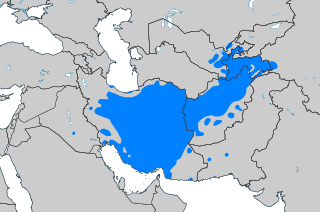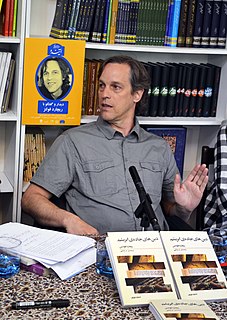
Persian, also known by its endonym Farsi, is a Western Iranian language belonging to the Iranian branch of the Indo-Iranian subdivision of the Indo-European languages. Persian is a pluricentric language predominantly spoken and used officially within Iran, Afghanistan and Tajikistan in three mutually intelligible standard varieties, namely Iranian Persian, Dari Persian and Tajiki Persian. It is also spoken natively in the Tajik variety by a significant population within Uzbekistan, as well as within other regions with a Persianate history in the cultural sphere of Greater Iran. It is written officially within Iran and Afghanistan in the Persian alphabet, a derivation of the Arabic script, and within Tajikistan in the Tajik alphabet, a derivation of the Cyrillic script.
The Persians are an Iranian ethnic group who comprise over half of the population of Iran. They share a common cultural system and are native speakers of the Persian language as well as of the languages that are closely related to Persian.

Tajiks are a Persian-speaking Iranian ethnic group native to Central Asia, living primarily in Afghanistan, Tajikistan, and Uzbekistan. Tajiks are the largest ethnicity in Tajikistan, and the second-largest in Afghanistan and Uzbekistan. They speak varieties of Persian, a Western Iranian language. In Tajikistan, since the 1939 Soviet census, its small Pamiri and Yaghnobi ethnic groups are included as Tajiks. In China, the term is used to refer to its Pamiri ethnic groups, the Tajiks of Xinjiang, who speak the Eastern Iranian Pamiri languages. In Afghanistan, the Pamiris are counted as a separate ethnic group.
Dari, or Dari Persian, is a political term used for the various dialects of the Persian language spoken in Afghanistan. Dari is the term officially recognised and promoted since 1964 by the Afghan government for the Persian language, hence it is known as Afghan Persian or Eastern Persian in many Western sources. As Professor Nile Green remarks "the impulses behind renaming of Afghan Persian as Dari were more nationalistic than linguistic" in order to create an Afghan state narrative. Apart from a few basics of vocabulary, there is little difference between formal written Persian of Afghanistan and Iran. The term "Dari" is officially used for the characteristic spoken Persian of Afghanistan, but is best restricted to formal spoken registers. Persian-speakers in Afghanistan prefer to still call their language “Farsi,” while Pashto-speakers may sometimes refer to it as "Parsi."

Nūr ad-Dīn 'Abd ar-Rahmān Jāmī, also known as Mawlanā Nūr al-Dīn 'Abd al-Rahmān or Abd-Al-Rahmān Nur-Al-Din Muhammad Dashti, or simply as Jami or Djāmī and in Turkey as Molla Cami, was a Persian Sunni poet who is known for his achievements as a prolific scholar and writer of mystical Sufi literature. He was primarily a prominent poet-theologian of the school of Ibn Arabi and a Khwājagānī Sũfī, recognized for his eloquence and for his analysis of the metaphysics of mercy. His most famous poetic works are Haft Awrang, Tuhfat al-Ahrar, Layla wa Majnun, Fatihat al-Shabab, Lawa'ih, Al-Durrah al-Fakhirah. Jami belonged to the Naqshbandi Sufi order.

Persian literature comprises oral compositions and written texts in the Persian language and is one of the world's oldest literatures. It spans over two-and-a-half millennia. Its sources have been within Greater Iran including present-day Iran, Iraq, Afghanistan, the Caucasus, and Turkey, regions of Central Asia and South Asia where the Persian language has historically been either the native or official language. For example, Rumi, one of the best-loved Persian poets, born in Balkh or Wakhsh, wrote in Persian and lived in Konya, at that time the capital of the Seljuks in Anatolia. The Ghaznavids conquered large territories in Central and South Asia and adopted Persian as their court language. There is thus Persian literature from Iran, Mesopotamia, Azerbaijan, the wider Caucasus, Turkey, Pakistan, Bangladesh, India, Tajikistan and other parts of Central Asia. Not all Persian literature is written in Persian, as some consider works written by ethnic Persians or Iranians in other languages, such as Greek and Arabic, to be included. At the same time, not all literature written in Persian is written by ethnic Persians or Iranians, as Turkic, Caucasian, and Indic poets and writers have also used the Persian language in the environment of Persianate cultures.

The Timurid Empire, self-designated as Gurkani, was a Persianate Turco-Mongol empire comprising modern-day Uzbekistan, Turkmenistan, Tajikistan, Kazakhstan, Iran, the southern region of the Caucasus, Iraq, Kuwait, Afghanistan, much of Central Asia, as well as parts of contemporary Russia, India, Pakistan, Syria and Turkey.

The culture of Tajikistan has developed over several thousand years. Tajik culture can be divided into two areas, Metropolitan and Kuhiston (Highland). Modern city centres include Dushanbe, Khudjand, Kulob, and Panjikent.

The Persian alphabet is a writing system used for the Persian language spoken in Iran and Afghanistan since the 7th century after Muslim conquest of Persia.
Following a crackdown on Iranian media beginning in 2000 many Iranians turned to weblogging to provide and find political news. The first Persian language blog is thought to have been created by Hossein Derakhshan,, in 2001. Derakhshan also provided readers with a simple instruction manual in Persian on how to start a blog. In 2004, a census of blogs around the world by the NITLE found 64,000 Persian language blogs. In that year the Islamic government also began to arrest and charge bloggers as political dissidents and by 2005 dozens of bloggers had been arrested.

Bukharian, also known as Judeo-Tajik, Judeo-Tadzhik, Bukhari, Bukharic, Bukharan and Bukharit, is the Judeo-Tajik dialect historically spoken by Bukharan Jews in Central Asia. It is a Jewish dialect derived from —and largely mutually intelligible with— the Tajik branch of the Persian language.
Davlatmand Kholov is a musician and singer from Kulob in Tajikistan. He is an expert in the southern folk genre of Tajik music called Falak. A multi-instrumentalist, trained in Shashmaqam at the Conservatory of Music in Dushanbe, he's well known for his works on the two-string dutar, ghijak, and setar which are popular instruments in Central Asia.

Fārsīwān is a contemporary designation for Persian speakers in Afghanistan and its diaspora elsewhere. More specifically, it was originally used to refer to a distinct group of farmers in Afghanistan and urban dwellers. In Afghanistan, original Farsiwans are found predominantly in Herat and Farah provinces. They are roughly the same as the Persians of eastern Iran. The term excludes the Hazāra and Aymāq tribes, who also speak dialects of Persian.

Iranian studies, also referred to as Iranology and Iranistics, is an interdisciplinary field dealing with the research and study of the civilization, history, literature, art and culture of Iranian peoples. It is a part of the wider field of Oriental studies.

The Tajik language has been written in three alphabets over the course of its history: an adaptation of the Perso-Arabic script, an adaptation of the Latin script and an adaptation of the Cyrillic script. Any script used specifically for Tajik may be referred to as the Tajik alphabet, which is written as алифбои тоҷикӣ in Cyrillic characters, الفبای تاجیکی with Perso-Arabic script and alifʙoji toçikī in Latin script.

Radio Zamaneh is an Amsterdam-based Persian language radio. "Zamaneh" is the Persian literary term for "time".
Iranian hip hop, also known to as Persian hip hop, refers to hip hop music developed in Iran (Persia) and in Persian language. It is rooted in American hip hop culture, but it has sometimes incorporated local elements such as Iranian classical music and literature.
Persianization or Persification, is a sociological process of cultural change in which a non-Persian society becomes "Persianate", meaning it either directly adopts or becomes strongly influenced by the Persian language, culture, literature, art, music, and identity as well as other socio-cultural factors. It is a specific form of cultural assimilation that often includes a language shift. The term applies not only to cultures, but also to individuals, as they acclimate to Persian culture and become "Persianized" or "Persified".
Iranians in the Netherlands form one of the newer and larger populations of the Iranian diaspora in Europe. Iranians in the Netherlands are referred to by hyphenated terms such as Dutch-Iranians, Iranian-Dutch, Dutch-Persian, or Persian-Dutch. Similar terms Iraanse Nederlanders, Nederlandse Iraniërs, and Perzische-Nederlanders may be found in Dutch-language media.

Richard Foltz is a Canadian scholar of American origin. He is a specialist in the history of Iranian civilization—what is sometimes referred to as "Greater Iran". He has also been active in the areas of environmental ethics and animal rights.












